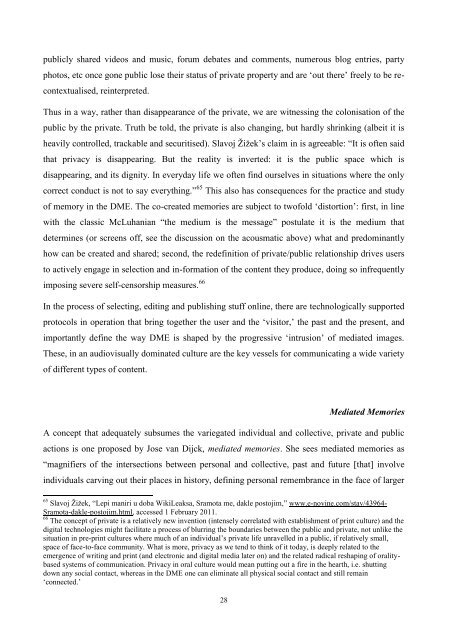UNIVERSITY OF NOVA GORICA GRADUATE SCHOOL ...
UNIVERSITY OF NOVA GORICA GRADUATE SCHOOL ...
UNIVERSITY OF NOVA GORICA GRADUATE SCHOOL ...
Create successful ePaper yourself
Turn your PDF publications into a flip-book with our unique Google optimized e-Paper software.
publicly shared videos and music, forum debates and comments, numerous blog entries, party<br />
photos, etc once gone public lose their status of private property and are ‗out there‘ freely to be recontextualised,<br />
reinterpreted.<br />
Thus in a way, rather than disappearance of the private, we are witnessing the colonisation of the<br />
public by the private. Truth be told, the private is also changing, but hardly shrinking (albeit it is<br />
heavily controlled, trackable and securitised). Slavoj Ţiţek‘s claim in is agreeable: ―It is often said<br />
that privacy is disappearing. But the reality is inverted: it is the public space which is<br />
disappearing, and its dignity. In everyday life we often find ourselves in situations where the only<br />
correct conduct is not to say everything.‖ 65 This also has consequences for the practice and study<br />
of memory in the DME. The co-created memories are subject to twofold ‗distortion‘: first, in line<br />
with the classic McLuhanian ―the medium is the message‖ postulate it is the medium that<br />
determines (or screens off, see the discussion on the acousmatic above) what and predominantly<br />
how can be created and shared; second, the redefinition of private/public relationship drives users<br />
to actively engage in selection and in-formation of the content they produce, doing so infrequently<br />
imposing severe self-censorship measures. 66<br />
In the process of selecting, editing and publishing stuff online, there are technologically supported<br />
protocols in operation that bring together the user and the ‗visitor,‘ the past and the present, and<br />
importantly define the way DME is shaped by the progressive ‗intrusion‘ of mediated images.<br />
These, in an audiovisually dominated culture are the key vessels for communicating a wide variety<br />
of different types of content.<br />
Mediated Memories<br />
A concept that adequately subsumes the variegated individual and collective, private and public<br />
actions is one proposed by Jose van Dijck, mediated memories. She sees mediated memories as<br />
―magnifiers of the intersections between personal and collective, past and future [that] involve<br />
individuals carving out their places in history, defining personal remembrance in the face of larger<br />
65 Slavoj Ţiţek, ―Lepi maniri u doba WikiLeaksa, Sramota me, dakle postojim,‖ www.e-novine.com/stav/43964-<br />
Sramota-dakle-postojim.html, accessed 1 February 2011.<br />
66 The concept of private is a relatively new invention (intensely correlated with establishment of print culture) and the<br />
digital technologies might facilitate a process of blurring the boundaries between the public and private, not unlike the<br />
situation in pre-print cultures where much of an individual‘s private life unravelled in a public, if relatively small,<br />
space of face-to-face community. What is more, privacy as we tend to think of it today, is deeply related to the<br />
emergence of writing and print (and electronic and digital media later on) and the related radical reshaping of oralitybased<br />
systems of communication. Privacy in oral culture would mean putting out a fire in the hearth, i.e. shutting<br />
down any social contact, whereas in the DME one can eliminate all physical social contact and still remain<br />
‗connected.‘<br />
28

















